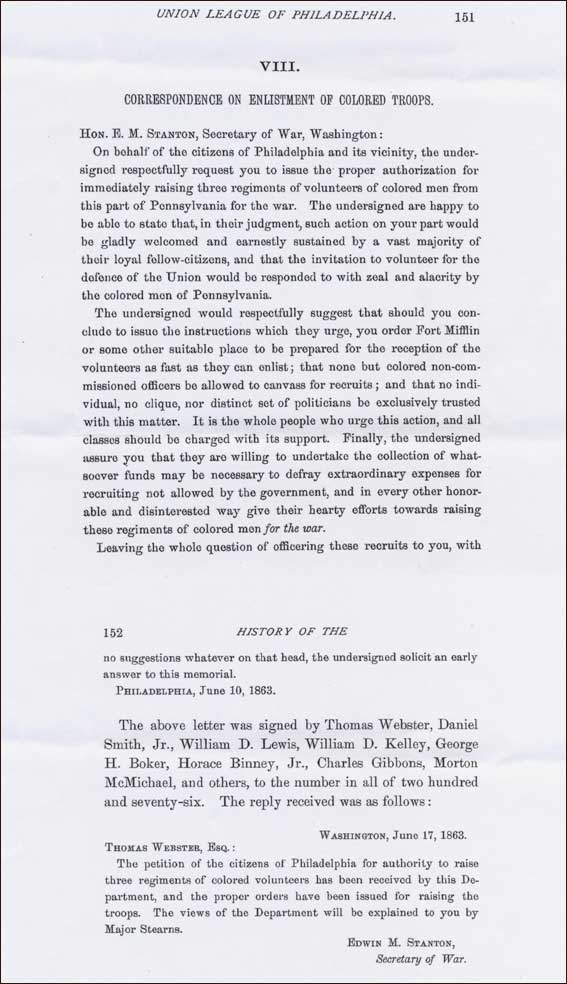The Union League’s Petition
For a long time the antislavery element of the League had advocated the organization of Negro regiments, and it became a topic of private discussion and personal correspondence. (James) Mc Kim and (Charles) Gibbons, recognizing the efficiency of Negro soldiers, found no difficulty in convincing hundreds of League members as well as outsiders of their views. One June 8, 1863, a meeting was held in the League house. Colonel Lafayette Bingham and Major George L. Stearns of Boston who were commissioned by Secretary of War Stanton to launch the recruitment in other states, spoke of their experience in Massachusetts. League member William D. Lewis, whose only son had been killed in combat, chaired the unusual meeting. It was resolved at this time that “no individual, no clique, nor distinct set of politicians be exclusively trusted with this matter. It is the whole people who urge this action, and all classes should be charged with its support.”
The 276 men who shortly thereafter petitioned the secretary of war for permission to raise Negro regiments included the first Republicans of the city and founders of the Union Club and The Union League. In the spirit of the League’s resolution of June 8, many interested Philadelphians threw their weight behind the new undertaking, and assured Stanton that they were willing to contribute the necessary funds not provided by the government. Initially, it was planned to raise three regiments for three years of service, or for the duration of the war. Stanton authorized the request in three days and machinery was set into motion for the first black regiments under federal colors.
Calling itself the Supervisory Committee on Enlistment of Colored Troops – (George H.) Boker preferred the word Black over Negro or colored—this same group worked independent of the League Military Committee, although League men served on both committees. Thirty of the most influential and articulate blacks of Philadelphia, among whom were Octavius V. Catto, Jacob C. White, Jonathan C. Gibbs, and Reverend William J. Alston, arranged for a mass meeting to open recruitment on July 6. Three antislavery champions of diverse backgrounds, Congressman William D. Kelly, Frederick Douglass, and Anna E. Dickinson, who at the time was only 22 years of age, addressed an audience still excited by the news from Gettysburg. Thomas Webster, who became chairman of the Supervisory Committee, was also a member of the Board of Publication, and at his request the proceedings and speeches were published by the Board as one of a series of items that related to the organization of Philadelphia’s black troops.
Ref.: Gentlemen in Crisis: The First Century of The Union League of Philadelphia 18621-1962; pg.46-47
Octavius V. Catto:
http://isc.temple.edu/awaskie/biography_of_octavius_v_Catto.htm
Jacob C. White:
Jacob C. White, Jr., Papers, Historical Society of Pennsylvania (Philadelphia, PA)
Congressman William D. Kelly:
http://bioguide.congress.gov/scripts/biodisplay.pl?index=K000062
Frederick Douglass:
http://www.history.rochester.edu/class/douglass/home.html
Anna E. Dickinson:
http://www.questia.com/PM.qst?a=o&d=29048203
The Petition and Reply
